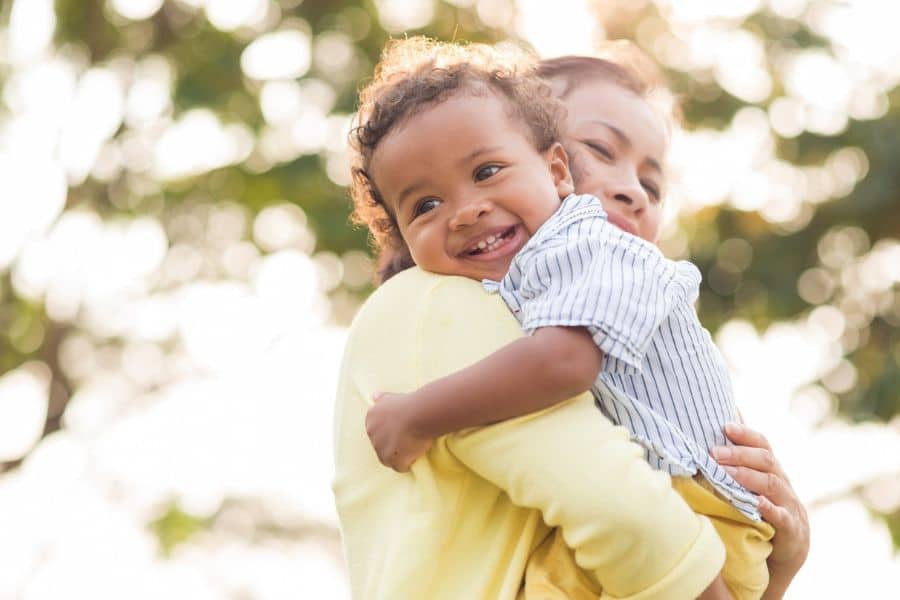Oh, temper tantrums! We don’t know how to deal with them!
They come in all shapes and sizes. They can involve spectacular explosions of anger, frustration, screaming, stiffening limbs, an arched back, kicking… Children can even hold their breath, run away, vomit, break things, or hurt themselves. You might feel embarrassed when your child “loses it” and starts to throw a fit in public! 😱
Many parents even fear tantrums, and some adults secretly believe that children are doing it on purpose to manipulate them…
But what if I told you that children’s temper tantrums are not what they seem to be and it’s nothing to be feared? 😈 We can relax about them and truly understand why children have tantrums.
Ah, I see, you don’t agree with me! 🤔
No way! Temper tantrums are evil! 😈 Hahaha
Can we relax about the tantrums?
Ok, can we relax about the tantrums? It’s true that it might seem a bit exaggerated and disrespectful when I say this, but please hear me out. I hear you, we have all witnessed children’s temper tantrums during our lives!
One day, when my son was about 2, he asked me to cut his piece of toast, and when I did, he said he didn’t want it cut. He kicked, screamed, and cried for like 5 minutes! See! What is that, if not an evil temper tantrum?” 😀
And that 2-year-old-ish child who was screaming at the top of their lungs in the supermarket, the other day, because she didn’t get their candy.
Or that little one at the park who was fighting against his mom because he didn’t want to put on his coat.
What are your thoughts when you observe this kind of scene with the little ones?
Let me take a guess 😁: “No way, what a spoiled child! What are the parents doing?” That’s exactly what I would have said before becoming a mom.
But what if we’re wrong about this judgment? Maybe it’s us, adults who don’t understand children?

Temper tantrums of our angry little monsters
Quite often, adults get into some power struggles when children turn into their “tantrum” mode angry little monsters.
And honestly, if we take the time to look at the word “tantrums”, it doesn’t suggest nice things, since it presents the child as “behaving badly”, or “acting out”, and suggests they might even have negative intentions.
Yes, many adults think that children often exaggerate, behaving this way intentionally in order to manipulate or dominate their parents! 😈😈
But these things are far from the truth!
In moments of “tantrums”, children are not looking for conflict or to manipulate us. They are not against us. No, children having a tantrum are not trying to make you live a difficult moment; they themselves are having a difficult moment because they are overwhelmed by their emotions.
Temper tantrums: a behavior that adults don’t understand
Isabelle Filliozat, a French child psychologist says
“A temper tantrum is a child’s behavior that the adult doesn’t understand. When children have strong reactions, it’s because they have a reason to have them.”
So let’s try to understand what exactly is happening during temper tantrums.
Understanding “Tantrums”: a new perspective
“A child deserves that we respect his grief, even though it be for the loss of a pebble.” – Janusz Korczak
Children lack the emotional maturity
Did you know that your children are unable to fully control their emotions before the age of 7? That’s because the part of their brain that controls their feelings and impulses is still developing.
And when your children cry or get angry, they are actually terrified by this emotion that they can’t handle. That’s when they need your help to calm down, to co-regulate, to feel safe and secure in your arms, to know that you are there to support them through the ups and downs of growing up.
But this is exactly the moment when many adults get triggered and do not feel safe in their own body. Understanding what is happening inside of our little ones can help us feel safe and regulate our own emotions.
Children don’t have the words to express their feelings
When they were babies, when our little ones cried, there was a simple and easy explanation, most likely a need that had to be met: they were hungry, thirsty, cold, too hot, their diaper was full, or they just wanted a cuddle. So we instinctively and quickly respond to their needs.
Then, they started talking. It became even easier because they could finally put words to their concrete needs. But when they face a setback, how can they express their emotions? They don’t yet have the emotional maturity, understanding, and vocabulary to express how they feel. This is when the tantrum occurs because it feels overwhelming and “tantrums” are the only way they know how to express emotions they can’t yet articulate.
Children struggle to do what they want
Also, toddlers don’t yet have good control over their bodies and lack some motor skills. They see the “grown-ups” or their older siblings around them doing things that they are unable to do; making beautiful drawings, building tall tall towers with building blocks without making them fall, getting dressed, and putting on their shoes all by themselves…
They can only make a scribble or stack three blocks before everything falls down. No matter how hard they try, their foot won’t fit into their shoes. It’s extremely frustrating for them. Hence, the emotional meltdown…
Children want to have a say and need to feel in control
Your little ones are now capable of doing more and more things on their own: they can walk, climb up the slide, ride their toy truck while sitting, and speak better (by the way, there’s a word they’ve integrated well, it’s “no!”).
So today, they’ve decided they’ll choose their own clothes and chose how they want to have their toasts, like everyone else! Well, yes, they’re big now! Obviously, if you dare to oppose their choice or try to help, well, it’s a guaranteed emotional meltdown!
In fact, as children grow and develop, they begin to assert their independence and crave more control over their own lives. But why?
This is because developmentally, children are learning to navigate the world around them, and gaining a sense of control is an important aspect of their growth. This includes feeling in control of their own body and emotions, as well as their surroundings.
When they experience a lack of control or frustration, it can lead to temper tantrums as a means of expressing themselves. As parents, understanding this need for control can help us support our children’s development and manage their tantrums with empathy and patience.

So why did I use the word tantrum?
As you may have noticed, I’ve used the word “tantrum” on purpose in this article to describe children’s emotional meltdowns and overwhelm. However, I never use this word in my everyday language when speaking about children’s behavior.
The reason for this is that the word “tantrum” often carries negative connotations and can imply that a child is being intentionally difficult or manipulative. This is not the case with young children, who are simply still learning to navigate and regulate their emotions.
The take-home message:
Toddlers and young children are still discovering their emotions. As parents, it’s not always easy to find ourselves in the middle of this whirlwind. But by using positive parenting tools, we can learn to accompany our children’s tantrums on a daily basis. We can also use Non-Violent Communication to support our children in learning healthy communication skills.
By respecting their emotional needs and setting clear limits in a respectful manner, you have all the tools to support your children as they learn to regulate their emotions.






